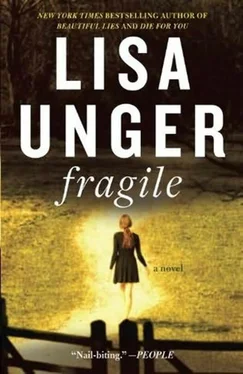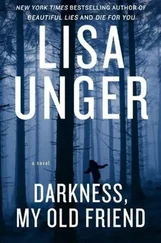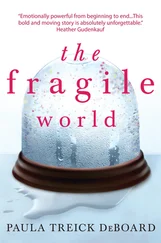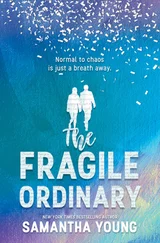“She was already dead, Ricky. He didn’t kill her.”
“Grandma… I don’t understand.” He felt a tingle of panic. Was she talking about Charlene? Did she know something? “Grandma? What are you talking about?”
But her gaze was glassy and distant, staring through him. She released a sigh and relaxed her hold on his arm. In the distance, he heard the wailing of sirens.
After calling Ricky several times to no avail, Maggie found herself at a loss. She considered calling her mother and then, when she noted the time, decided against it. She wouldn’t “keep looking,” as Jones had urgently requested, nor would she go out after Ricky and drive aimlessly searching for him. She couldn’t think of anything more crazy-making.
So she found herself paralyzed, staring at the cordless phone in her hand, trying to figure out an appropriate course of action-one that was reasonable and productive, not the unhinged move of a frantic mother, or the fearful action of an overly obedient wife. Even if Jones didn’t know their son, she did. He would call or come home, and he would do it sooner rather than later. Or so she hoped.
But then the phone was ringing in her hand. She answered it without glancing at the caller ID.
“Hello?”
“Dr. Cooper?”
Her heart sank to hear an unfamiliar voice. “Yes, this is.”
“It’s Angie Crosby.” In the current chaotic context, it took Maggie a moment to place the name. Marshall’s mother.
“Oh, Angie.” Maggie’s worry about Marshall returned to the forefront of her mind for a moment. And she was ashamed to note that she was almost glad for it, the distraction from her personal crisis.
“It’s late,” said Angie. “I’m sorry.”
“No, it’s quite all right. I’m up,” Maggie said. “What’s wrong?”
There was silence on the other line and then a muted weeping.
“Angie?” Maggie said. “What is it?”
“I’m sorry I hung up on you before. I didn’t want-But now I’ve been thinking.”
“What’s happening?” Maggie felt a flutter of fear and something else she wouldn’t have admitted, the relief of being on solid ground, of knowing what to do, what to say.
Angie issued a few more shuddering breaths, then, “He came here earlier today.”
“Okay,” Maggie said. “And something happened between you. Tell me about it.”
Stop shrinking , Jones would say to her. You use those benign questions and leading statements as a shield, Maggie. Always calm, always in control, always looking for a way to “help.” But where are you ? What do you need? What do you feel? He was right, in a way. It was always so much easier to help others than it was to help yourself. But what was wrong with that? It was her job.
“Something’s happened to him,” Angie said. “He’s changed.”
Maggie opted for silence. Sometimes that was a better way to draw things out than the affirming statement or coaxing question.
“He said that Travis was right,” Angie went on after a moment. “That all women were whores and users. Especially me.”
Maggie realized she was gripping the phone, leaning so hard against the table that the edge was digging into her rib cage. She forced herself to lean back and breathe. When the other woman didn’t continue on her own, Maggie said, “Did he hurt you?”
More muffled crying. “He pushed me, hard against a wall of shelves. I hit my head on a corner-hard enough to black out.”
“I’m so sorry, Angie. Are you all right?”
“I am. But when I came back around, Marshall was gone.”
Maggie wanted more details about how the encounter had started and what had happened to make it escalate to violence, though she saw from Marshall’s actions in her office earlier that there was a simmering rage there, just waiting for an opportunity to boil over.
“When I talked to you earlier, I was upset about what happened between Marshall and me,” Angie went on. “I figured I’d change my locks and not be so quick to answer the door to him next time. I didn’t want him to get in trouble, you know. So much of what’s wrong with him is my fault, Dr. Cooper. I know that. I left him to Travis.”
Angie started crying again. Maggie felt her own eyes tear; she could hear so clearly the pain and frustration in the other woman’s voice.
“So what’s changed since last we talked?” Maggie asked. “Did he come to your house again?”
“No, no. After I talked to you and pulled myself together, I had a horrible thought. I keep guns here in my house. A revolver and a semiautomatic weapon. I have a license and am trained to use them.”
“Angie.”
“They’re gone, Dr. Cooper. Marshall stole my guns.”
The words made Maggie feel sick, as if she couldn’t draw another breath. The thousand incredulous questions she wanted to ask- Didn’t you have them locked up? How did he know you had those guns and where you kept them? When was this and how long did it take you to call me?- lodged in her throat. The best she could do was to say, “Oh, my God, Angie. Did you call the police?”
Maggie heard Angie blowing her nose. Then, “No.”
“What?” she said. “Why not?”
Another sniffle. “I didn’t want to get him in trouble.”
Maggie issued a long, slow breath. “Okay. What you need to do, right now, is hang up the phone and report the theft to your local police department. You need to tell them that Marshall is unstable and that he is armed.”
“I don’t want to call the police on my son, Dr. Cooper.”
“You don’t have a choice. This is not just about Marshall anymore.”
Maggie found herself staring at a picture of Ricky, Jones, and her that hung on the opposite wall. Ricky was maybe three at the time. They were all dressed up, smiling. She used to think when Ricky was small how hard it was to protect him-from falls, from disappointments-how she worried about things like what he was eating and whether he was watching too much television. Compared with the things that came later, that time seemed idyllic and innocent. It was amazing how many different ways you could fail your child without even realizing it.
“Angie,” said Maggie, trying for a tone that was calm but stern, “report the guns stolen and alert the police in your area, in case he’s still nearby. And I’ll do the same here in The Hollows.”
The other woman was silent; Maggie could hear her breathing.
“Angie.”
“I thought you would want to help him,” she said, sounding petulant and angry now. Poor Marshall , Maggie thought. Did he ever have a chance with parents like this?
“This is helping him. We’re helping him not to hurt others or himself.” Was it not obvious?
“Okay,” Angie said. “Thanks. Thanks a lot.”
Maggie heard Angie slam the phone down hard and fought back a tide of anger.
She dialed Jones first and got no answer, left a message on his voice mail. Then she called the nonemergency number at the precinct and alerted Cheryl, the woman who answered, to the situation with Marshall. Then she called Chuck, for lack of any other options. His number was posted over the phone.
“Ferrigno,” he answered. He somehow managed to infuse fatigue and annoyance into the syllables of his name.
“It’s Maggie.”
“What’s up?”
She told him about Marshall and the stolen guns. “Does Jones know about this?” asked Chuck when she was finished.
“No, I can’t reach him.”
“Okay. I have to go.”
“Why? What’s happening?”
“Just stay put, Maggie. I’ll call you in a while.”
He ended the call then without another word. In her frustration at being hung up on again, Maggie slammed the phone down on the table, releasing a little roar of anger. She got up and grabbed her purse from the counter. She couldn’t just sit there waiting for a phone call for the rest of the night. She had to do something. She didn’t know what. She dug around for her cell phone and, when she found it, realized that it was dead. She’d charge it in the car.
Читать дальше












